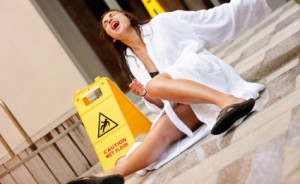The law in years past has vacillated in slip and fall cases in business establishments involving water or other similary transitory substances. For the past several years, actual or constructive notice has been the requirement. And, in a recent case, the Third District Court of Appeals dismissed a Plaintiff’s claim because, as they said, the “record here is devoid of any evidence suggesting that the Appellees had any notice—either actual or constructive—of the water on the floor.” Kenz v. Unicco, 116 So. 3d 461 (Fla. 3rd DCA 2013). In Kenz and for the foreseeable future, a Plaintiff must show evidence that the Defendant had actual or constructive notice of the condition that caused him or her to slip and fall and be injured.
Suffering a slip and fall can be both dangerous and embarrassing. If you suffered a slip and fall because of the negligent behavior of another party, you may be able to recover damages.
To recover damages, an attorney would have to prove not only that the injured party slipped and fell, but also that the owner of the property was liable. Then, we would need to prove that it was foreseeable that the property owner’s negligence would create the danger that caused your injury.
Showing that the owner of the property was liable is where it can get tricky: We must first show that there was a dangerous condition on the property. Second, we have to show that the owner knew or should have known about the dangerous condition when the injury occurred.
That is where Wolfson Law Firrm comes in. We will work to prove that the property owner knew or should have known of the dangerous condtition. Florida Statute 768.0755 is the Florida Statute that governs slip and falls on transitory substances inside stores. It requires that a Plaintiff show the following:
- The property owner was aware of the dangerous condition, and negligently failed to correct it; or
- The dangerous condition was in existence for enough time that a reasonable property owner should have discovered it, and taken action to remedy it before the injury occurred.
If you want to see the actual law, click on this link: Premises Liability
Transitory means “tending to pass away or not persistent”. Essentially, the law appears to describe the objects falling within it as transitory because it attempts to capture those things that can be moved with ease or can appear on the ground with ease. Such a substance inside a store could be anything from water on the floor to a strawberry that fell off of a display.
Finally, proving that the property owner had notice of the dangerous condition can be illustrated by the age old slip and fall on the banana peel visual that often is the subject of cartoons. If somebody drops a banana peel in a grocery store, and there is direct or circumstantial evidence that nobody working in the store picked up for multiple days, then this is a strong case that the Defendant had notice. Direct evidence could be photographic or testimonial evidence that the object was there for a long period of time. Circumstantial evidence would be the rotten condition of the banana peel. That is, if the banana peel is blackened and rotting, then this is circumstantial evidence that the peel was “in existence for enough time that a reasonable property owner should have discovered it, and taken action to remedy it before the injury occurred.”
On the other hand, if the banana peel was fresh and bright yellow and there is no evidence that it was there for any period of time prior to the incident, than this is a bad case on notice and likely the subject of a Defendant’s motion for summary judgment that would cause the case to get dismissed.
The law is not a bad one, though. From a basic fairness perspective, how can we hold people liable for something they didn’t have a chance to clean up? Again, as said above, a property owner is not an insurer for every accident that happens on the premises even if there is an absence of notice or negligence.
Our Task
Our main task at hand will be to prove that the property owner did not act in such a way that a reasonably prudent person would have. In other words, we must show that that the property owner acted in such a way that was out of the ordinary of what is normally done and of what is expected to be done, and that this negligence caused your injury.
How You Can Recover
We care about each and every one of our clients that has suffered, and we will fight to get you the compenstation you deserve. An injured party often should contact an attorney as soon as soon as they can after they suffer a slip-and-fall injury. This is important because the victim of the injury may forget details of the accident that may be important in their ability to recover damages.

